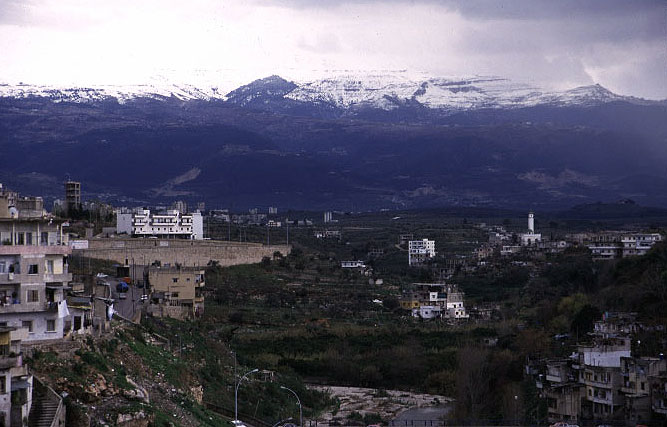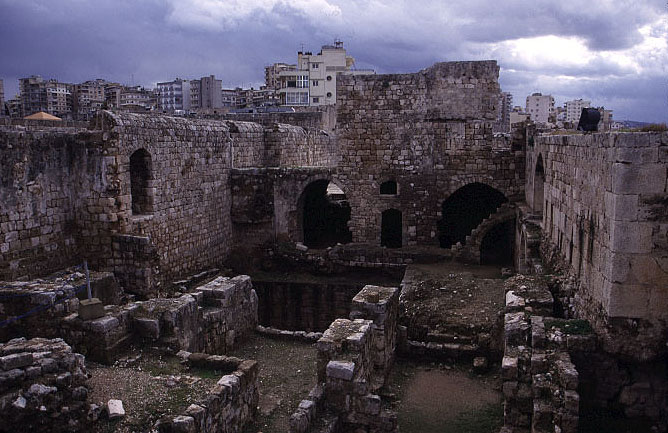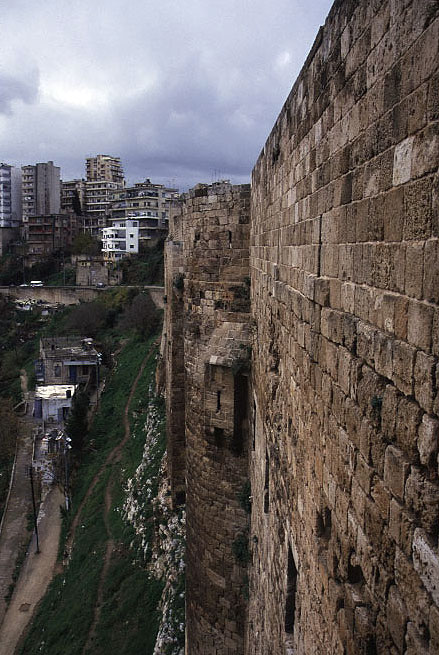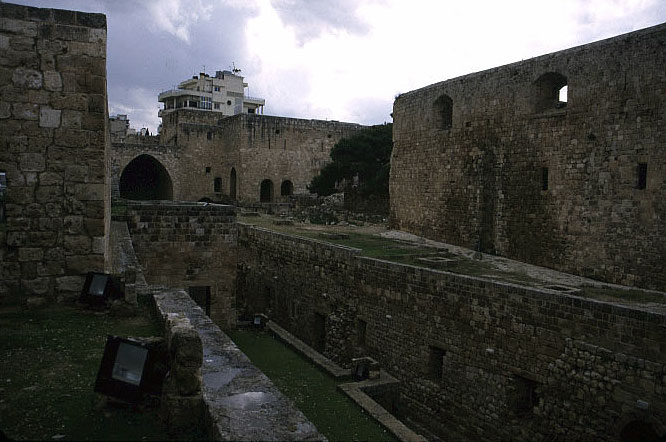Lebanon: Tripoli, Beirut

January 6, 2004
I didn't sleep well in the large room and simply had to wait for the sun to come up before I could scurry off to the bus station. My mind just couldn't still itself enough in order for me to sleep. At 7 I walked up to the Karnak station and found someone to sell me a ticket to Tripoli on the 8 am bus and sat down for a couple cups of Arab coffee with some others who were waiting for the same bus. A friendly man, who turned out to be the driver, exchanged some tobacco with me and asked me to tell him about my trip so far. Syrians, I suspect, take great pride in their country and want to hear how people have found it, especially Americans.
When the bus arrived at the Lebanese border, he followed me inside to both the Syrian exit station and the Lebanese entrance station to help me get through smoothly. Indeed, his help was necessary as I had no Lebanese lire, and they wouldn't take Syrian pounds. I had only 20 dollar bills with me, which was far too much for the visa. The driver took a bill with him and found someone outside who would change the money and then returned. Needless to say, the exchange rate was exceptionally poor, but this is to be expected. On the way out we picked up some friendly Lebanese border guards (the military always seems to ride for free on mini buses) with who I chatted all the way to Tripoli. On the outskirts of town, we stopped at a store so that the driver could buy some things that he could not get in Syria. Across from the store was part of a large, sprawling Palestinian refugee camp. I felt the usual anger and resentment that a prosperous person does whenever they are confronted with abject poverty: Why in the world would you ever live like this? Why don't you clean up the trash from your yards and take a bath once in a while? Damnation! Israel is a state and it isn't going to go away, so you better get used to it and move on with your life. Do something other than sit around a dirty, decrepit camp! I've had similar thoughts when driving through Indian reservations in the southwest US.
Palestinians are barred from working in Lebanon, at least officially, which means that hard currency is hard to come by and much of their existence comes from aid groups or by working in exploitive, underpaid, conditions. They are detested by those in the country around them because they have to exist in such trying circumstances. With the loss of hope for a better tomorrow, what reason is there to pick up windblown garbage or to try to make a better life for yourself? After a while, the reason for "moving on" disappears and all that is left is the vision of an idealized future state. A vision that the camp dwellers realize will never come. Hatred builds and, to paraphrase Malcolm X, the most dangerous thing in Society is a man with nothing left to lose. Much of the current Intifada could be traced to the camps. Much of the Lebanese Civil War could be traced to the camps. So much pain and suffering occured inside of them, and spread outside in the process. Looking at the camps, I wondered what the future was for peace in the Middle East. As long as the camps existed, there could be none. Getting rid of the camps meant returning the inhabitants to Israel (which it would never allow on a large scale as it would change the nature of that state) or of allowing them (and convincing them of the need) to become citizens in Lebanon, Syria, Jordan, and Egypt. I thought it unlikely that either solution would ever happen. I was glad when the driver came out of the the store and we started off once again.
The bus driver dropped me off at a public garden in the middle of town and one of the border guards offered to show me a few things before he had to go off and report to someone or other. He walked me around and introduced me to some friends of his that changed money, which isn't really necessary for one with US dollars. The point was not to change money, I realized, and win a commission from his friends, but rather to introduce me to people who might be helpful to me in the future. The border guard wasn't operating out of any motive other than to be helpful. He showed me a nice restaurant and then apologized for having to leave me so soon and encouraged me to seek the aid of the money changers if I had any problems in town. I wondered if I would have done the same had I run in a Lebanese tourist on a Greyhound.
I bought some coffee in a cafe near the edge of a park and sat underneath an umbrella as it slowly rained. It wasn't much past 10 and was far too early to check into a hotel. The drizzle let up and I went out for a walk and found Hotel Koura about two minutes from the main square where I was dropped off. I didn't go in and instead set off on a walking tour of Tripoli. The main attraction of Tripoli, for me, was the Old City and the Citadel of Raymond de St. Gilles, known locally as Qala'at Trablous (Qala'at means castle, Trablous is the Lebanese name for Tripoli). Of course, I got lost almost immediately, which really is a positive rather than a negative. I found a truly amazing felafel place which served up a sandwich that was the approximate size of my forearm. It was easily twice the size of the excellent felafel sandwiches that I had enjoyed in Aleppo, although the pickles were not quite as strong. I walked and walked and walked some more, getting far outside the Old City and never once spotting the citadel. At one point I ended up on something that looked like a freeway and decided that if I went any further, I'd eventually end up back in Syria.
I got myself pointed in the right direction and walked for an hour back to the main square and then to Hotel Koura. Run by two sisters, the hotel was immaculate. A bed in the dorm room would be $7 and they found it rather surprising that I would want such a thing. They had an exquisite private double room for only $20 and I suspect they were used to having tourists prefer this to the dorm accomodation, which is where locals slept. Neither my French nor my Arabic was good enough to explain why I wanted to be in the dorm, and I hoped they would chalk up my eccentricity to a tight budget. I took a nap and woke up feeling a bit under the weather, which I attributed to mild dehydration from the last few days of travel. I set off for the citadel and found my way easily enough. As usual, I had to leave a large bill at the the entrance and hope to get change on my way out. This was so usual that I no longer thought anything of it and had never had any problems getting the change in the end.

The citadel really was rather nice, if smaller than the famous ones in Aleppo or Krak des Chevaliers (what could live up to that one?). Raymond de St. Gilles was a Crusader of some importance who held the town of Tripoli. His daughter was arranged to be married to the emperor of Byzantium and she was loaded up on twelve ships that were to carry her and a massive dowry to Constantinople. At the last minute, the emperor sent word that he had broken the engagement and was going to marry someone else.

In a rage, Raymond unloaded the dowry and packed the ships full with soldiers and sent them off to sack Constantinople. My guidebook didn't mention what happened to the daughter, but I suspect she lived out her life in a convent. I was feeling worse and worse and was rapidly losing energy. Slight bouts of dizziness struck me and my mood began to darken, especially as a group of young Lebanese boys were determined to show me around the citadel and to try their English on me. However, mostly their English consisted of the word, "dollar," and little else. Having a citadel like this to play in must lead to some great adventures for the local boys, and I was happy for them, but I was rapidly losing energy with which to entertain them.

felt like the gripe was starting to descend upon me and I was happy when I finally managed to give the boys the slip by finding a small outcropping on which to sit and look over the town. The snowy mountains were clearly visible in the distance and I thought about the massive Krak des Chevaliers sitting in one of the few gaps in them.

By 2:30 in the afternoon I was really in bad shape and started to wander back to the hotel, almost forgetting my change in the process. Stomach cramps from dehydration and a fever set in, combining the effects from two maladies in my poor body, led to a rather sorry appearance when I rumbled into the Hotel Koura. The fever changed to the chills and I shivered away in front of the television wrapped in a blanket. I took some Dayquil, which helped some, but mostly I sat and watched Al Jazeera with one of the old men staying in the hotel who seemed to do some maintenance in return for his room and board. Time passed interminably in front of the idiot box. I watched a terrible mambo movie and then one called Sleepless, with Michael Keaton and Gena Davis about political strategists. The Koura sisters could see that I was clearly under the weather and brought me some chestnuts to eat and a cup of tea occasionally. I drank down water hoping to get rid of the dehydration, but by 8 pm finally gave up and stumbled off to bed. I didn't bother taking off my clothes or my shoes and simply stuck my feet out and off the bed onto a chair. I was too weak to take them off.
After a rough night, I awoke feeling better: The fever had broken and the cramps were diminished, although they came back from time to time. I stayed in bed, dozing, until 10 whnI got up and went out to the front room to watch more Lebanese television. Here I sat, not moving much beyond reaching for my water bottle, until the early afternoon when I felt good enough to go for a short walk. I found a pizza place and stood on the corner talking with a teenager as I ate down a cheese pizza, wrapped up like a felafel or shawarma. I made a circuit through the souq looking for some soap, but failed to find any, which was surprisingly given that Tripoli is known for having famous soap. In contrast to the souqs of Damascus or Aleppo, the Lebanese don't seem to be as eager to employ touts or engage in the hard sell. Merchants would watch me go by and were ready to speak with me if I showed interest, but I already had enough souvenirs for home and didn't really want to buy more. My weakness returned and I walked back to the hotel after an hour or two in the open air and resumed my place in front of the television. It rained heavily, and even hailed for a while, which gave me an excuse not to go out again for dinner.
I should feel better tomorrow as the cramps are gone and I am now rehydrated. All I have to do is to regain my strength, which means that I should have gone out for dinner tonight. The Koura sisters brought me a few chestnuts again along with a glass of tea and I wished I knew enough French or Arabic to tell them, truly, how much I appreciated these things. More Al Jazeera and the Mothman Prophecies and then deep, restful sleep closed out an extremely lazy day.
I felt very good in the morning and was surprised by how much energy I had, given that I ate only sparingly yesterday. At 10:30 I paid my bill and walked out in search of some coffee and breakfast to start the day with. I found some excellent French-Lebanese hybrid pastries in a shop down the street and drank two cups of coffee at the cafe in the park before venturing over to the main square and the horde of service taxis. As expected, getting a lift to Beirut was not hard and I soon found myself sitting in a Mercedes waiting for other passengers. I waited. And waited. And waited. After forty minutes, I was still the only person in the Mercedes. A man walked over and tapped on the window to get my attention, saying only, "Come with me." Not sure what he wanted, he opened the trunk and retrieved my pack for me, then led me over to another taxi. Nasser, for that was his name, was a local businessman and had seen me sitting in the taxi for a long time. He was driving down to Beirut to drop off some stuff and thought he might bring me along for the ride. Not interested in money, you see. He just wanted some company and the opportunity to do a good deed. I put my pack in the trunk of his Mercedes, on top of about fifty kilos of raw, cut up lamb and we were off.
Nasser spoke very good English and we chatted constantly as we roared down the coast. We picked up a few people as we went, dropping them off here and there, and at eat stage Nasser refused payment for the ride. Nasser was proud of his country and wanted to show me all the places that I had missed in Lebanon. We exited the highway and drove through Byblos so that he could show me some of the famous ruins and was determined to take me up into the mountains to show me others. As we got to know each other better the conversation moved from the ordinary tourist talk to more important topics. We spoke of Bush and American and the Middle East. He wanted to know what I thought of America and when I told him I loved my country, that it was the best in the world, he nodded knowingly. "Ah, my dear. A person who does not love his country cannot love anything else." Whenever I said something that he especially liked he called me, "My dear," and patted me on my shoulder. He owned a few businesses along the coast including a restaurant in Jounieh, at which we stopped to deliver the meat. We swung by a bakery called Sea Sweets where I loaded up on the best pastries I have ever had. Small, rolled up phyllo tubes stuffed with a very fluffy sweet cheese and studded with honeyed pistachios and topped with candied rose petals.
We spoke of the civil war and why I was not married, which he found very strange for someone of my age. Different customs, I explained, which he immediately understood. How many children did I want? Why didn't my parents have more than two children? He, himself, had five children, three of them boys, and his wife was pregnant with their sixth. We exchanged email addresses and even telephone numbers and he insisted that I call him when I returned to Lebanon. For, it was not a question of if, but when for Nasser. We rolled into Beirut and drove up into the hills to the new US Embassy. The old one had been completely destroyed by a truck bomb in the 1980s and Nasser insisted that I see how my government existed in his country. Indeed, it was an instructive excursion. The embassy was perched up on a hill side accessed only by a long, winding road on which it would be impossible to rapidly drive a truck filled with explosives. A long gate, complete with gun towers ringed the buildings, which could only vaguely be seen from the street. Nasser slowed down to a crawl, but never stopped as we went by. The culture of fear that the staff must live through would surely drive people to despair in the long run, or at least distort the reality around them. We both agreed that it was sad that the Embassy staff would have to live in such a way and that it would, in the end, prevent them from coming to anything resembling an accurate picture of the country in which they lived. The security, we also both agreed, was necessary as long as my government continued to act in the way it did.
From the Embassy we coasted downhill and past a Starbucks, the first western chain store that I had seen in the Middle East. We crawled through the thick traffic of Beirut and into the fashionable Hamra district, where I was planning on staying for my last night in town. Hamra had become the focal point of Beirut during the Civil War because downtown was the scene of so much bloody struggle between the various militias, the various governments, the Syrians, the UN, and the PLO. Nasser dropped me near a place that he had stayed in before and recommended, and we parted with the traditional two air kisses by the other's ears. I was, as with Travolta and Kemal, sad to see him go. As he pulled away, it began to rain and I slogged through the streets of Hamra with no particular purpose in mind.
My guidebook mentioned that a place called the Mayflower was popular with expats and had a nice bar, so after getting thoroughly soaked, I found the hotel and checked in for the rate of $40 a night. Posh and modern, the Mayflower was nice but had little other than cleanliness to recommend it. I would have been just as happy in Tallals. I arranged for a 5 am taxi ride to the airport and then set out to see something of Beirut, now that the rain had stopped. The American University was close by and, not surprisingly, the district had the feel of any other university district in a large US city. I sat in an internet cafe for an hour wading through almost 500 email messages, mostly unimportant, and drinking coffee before walking some more. I returned to the hotel and went down to the pub, but found it mostly empty. Beer was expensive, and they had a very limited menu of food. That was fine with me, as it would give me a chance to get a last shawarma before leaving. All I found was a truly awful lamb one for about three times the price as anywhere else. I bought a few cans of beer from a liquor store and then retired to my room to watch television and think about the future. My trip was over the moment Nasser and I parted ways, I realized. I sipped beer and tried to gain some sort of perspective on the last three weeks, but couldn't find any. At this point, I could have been anywhere in the world, locked up safe and sound in the security of a throughly western hotel, watching satellite television. And so I sipped beer and waited for 5 am to come about.





